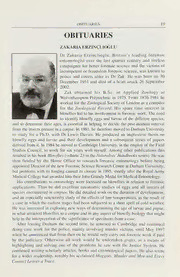Table Of ContentOBITUARIES 19
OBITUARIES
ZAKARIA ERZINCLIOGLU
Dr Zakaria Erzinclioglu, Britain’s leading forensic
entomologist over the last quarter century and tireless
campaigner for better forensic science and the victims of
incompetent or fraudulent forensic science, was known to
police and courts alike as Dr Zak. He was born on 30
December 1951 and died of a heart attack 26 September
2002.
Zak obtained his B.Sc. in Applied Zoology at
Wolverhampton Polytechnic in 1975. From 1976-1981 he
worked for the Zoological Society of London as a compiler
for the Zoological Record. His spare time interest in
blowflies led to his involvement in forensic work. The need
to identify blowfly eggs and larvae of the different species,
and to determine their ages, is essential in helping to decide the post-mortem interval
from the insects present in a corpse. In 1981, he therefore moved to Durham University
to study for a Ph.D. with Dr Lewis Davies. He produced an impressive thesis on
blowfly eggs and larvae and their development and a subsequent series of papers
derived from it. In 1984 he moved to Cambridge University, in the employ of the Field
Studies Council, to work for six years with myself. Among other publications this
resulted in his book Blowflies (volume 23 in the Naturalists'Handbooks series). He was
then funded by the Home Office to research forensic entomology before being
appointed Director of the new Forensic Science Research Centre at Durham University;
but problems with its funding caused its closure in 1995, shortly after the Royal Army
Medical College had awarded him their John Grundy Medal for Medical Entomology.
His contributions to entomology were focussed on blowflies in relation to forensic
applications. Thus he did excellent taxonomic studies of eggs and all instars of
species encountered in corpses. He did detailed work on the duration of development;
and an especially noteworthy study of the effects of low temperatures, as the result of
a case in which the earliest stages had been subjected to a short spell of cold weather.
He was interested in exploring new ways of determining the age of larvae and pupae,
in what attracted blowflies to a corpse and in any aspect of blowfly biology that might
help in the interpretation of the significance of specimens from a case.
After leaving Durham the second time, he returned to Cambridge and continued
doing case work for the police, mainly involving murder victims, until May 1997
when he announced that from then on he would only carry out forensic work if paid
by the judiciary. Otherwise all work would be undertaken gratis as a means of
,
highlighting and solving one of the problems he saw with the Justice System. He
continued writing scholarly articles, books and entomological papers. He also wrote
for a wider readership, notably his acclaimed Maggots, Murder and Men and Every
Contact Leaves a Trace.
20 ENTOMOLOGIST'S RECORD, VOL. 115 25. 2003
i.
In pursuit of his desire to raise standards in forensic science, and to rid the field of
charlatans, he not only wrote articles for scientific journals (such as Nature) and
newspapers, but he also wrote well argued submissions to the House of Lords Select
Committee on Science and Technology when it considered Forensic Science, to the
Royal Commission on Criminal Justice, to the Working Group on Forensic Science
chaired by Lord Lewis of Newnham and to the Council for the Registration of
Forensic Practitioners. Increasingly he became more and more involved in cases of
wrongful imprisonment due to flawed or fraudulent forensic science. His practical
steps to try to remedy this situation included a conference in July 2003 in Cambridge
and a proposal to found the Solon Institute for forensic sciences. This is planned to
be devoted to research in forensic science and casework undertaken free of charge
and disclosed to both sides. This is an imaginative concept that deserves to be
implemented. Indeed it would be a fitting memorial to Zak.
Zak is remembered by all those of us who were privileged to know him as a man
of immense integrity, compassion and courage in standing up for what he believed to
be true or just. He was also a devoted family man, and deepest sympathy is extended
to his wife Sharon and three children, Tanya, Larissa and son, Aksel.
Henry Disney
DENNIS O’KEEFFE
It was with a feeling of the deepest regret and sadness to
Kent entomologists to learn of the death of Dennis
O'Keeffe on 19 October 2002 after a brief, unexpected
illness. So sudden was this that an eagerly anticipated
visit to the Scilly Isles had to be cancelled at very short
notice. He was born on 9 September 1935 at Peckham, in
south-east London. Luckily, the family moved to Sidcup,
Kent shortly before the house in London was destroyed in
an air raid. By that time, however, even Kent was not
considered safe anymore so the family packed their bags
and moved to Blackpool. On their return to Sidcup in
1943, Dennis attended the local convent school and
completed his education at St. Mary’s College in 1953.
National Service in the RAF followed and a serious interest in long distance running
occupied his spare time.
The move to Sidcup was to a house adjacent to open fields and here his passion
for butterflies and moths was established; according to his sister Theresa starting as
early as thirteen years old. His parents would allow him to put a bedside lamp close
to an open window so that he could look at the moths that came to the light. At the
same time, he put together a small collection of butterflies and moths. The funds that
he needed to finance his hobby came from paper rounds and Saturday meat
deliveries. He was close to L. Hugh Newman’s butterfly farm at Bexley and was a
frequent visitor there.

